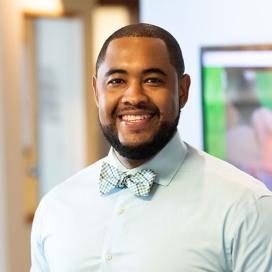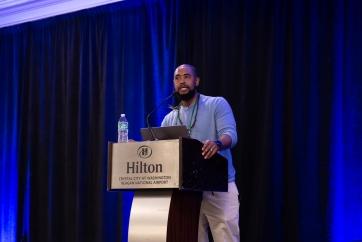Meet REVISE: Stephen Alkins
"The REVISE center isn’t the savior. The field itself is the savior."

We are excited to share our interview with Stephen Alkins, who is one of the co-principal investigators and the Director for Vision and Accountability at REVISE.
Can you please introduce yourself and your role on REVISE?
My name is Steven Alkins, and I am the director for Diversity Equity Inclusion and Belonging at TERC. I currently serve as the Director for Vision and Accountability for the REVISE Center.
What inspired you to co-develop this center?
REVISE centers around people who have been invested in advancing equity in the informal science, technology, engineering and mathematics (STEM) education field and the work that all of us do. Advancing equity would be done in the establishment of equitable partnerships and work with historically excluded communities who are committed to advancing equitable goals. We envisioned that REVISE wouldn’t be just a resource center for the research community but center diverse audiences in the informal science space. We’re thinking about practitioner career paths and practitioners as researchers. We’re thinking about evaluators from the learner perspective and centering them to help inform research agendas.
Co-developing REVISE gives us the opportunity to be an advocate for progressive social change within the field. The ways in which we're modeling equitable practices can become a model for other areas of the broader aspects of STEM.
What drew you to STEM and informal STEM?
I'm an avid freestyler (rapping on-the-spot) and lover of hip-hop. One day somebody asked me how I was able to freestyle, and it made me think of the neurobiological process behind improvisation. It’s a complex process to be able to draw memories from the hippocampus, being able to do this in a syncopated rhythm, and connect to other areas of the brain. It was an interesting intersection of arts and STEM.
This led me to pursue a PhD in cellular neuroscience. The arts helped me understand concepts and the approaches that we use in biological sciences. The relationship between STEM and my love of the arts and hip-hop is a form of informal learning, so working with REVISE is like reconnecting with an old friend.

What has been your experience in community building and the partnerships that you've worked with?
I wanted to directly connect researchers with things that were going on in the community during my first year at TERC. Researchers can feel removed from community spaces unless they're doing research with participants. I connected with Black Girls Code to do a community event in Boston where we did beta testing on the game Zoombinis, which is a TERC product designed to enhance computational thinking. We were able to connect a learning community from a historically excluded group to computer science and STEM. We later found out that there is a relationship between the libraries, YMCAs, and community centers in the Boston area. Because of that, we were able to get these multi-partnerships and the library partnering with the YMCA.
I think we need to convene and create authentic communities of practice when developing partnerships. When is that critical inflection point to push into modes of activism? Our REVISE partners include CAST, who is foundational in thinking about universal design learning. We have also partnered with Organic Oneness, who has expertise in working with groups that have been historically excluded and understanding the importance of counter spaces. Digital Promise provides an equity focus within digital spaces, and the Detroit Zoo knows how to bring marginalized communities into informal STEM spaces and the systemic issues that exist at cultural institutions. Those are partnerships that exist now and I’m looking forward to cultivating more.
How do you engage with community members to build those partnerships and gain trust with them?
"Equity moves at the speed of trust. You can't rush relationships, and you cannot treat it as transactional."
Transparency and active listening. We need to listen to communities. We don’t want to wait for them to get to the end of their sentence so we can offer our product or research project. Doing this means they will not be involved in the development, the sharing of the results, or the data management. You have to listen to the needs and the desires of the community instead. If there's alignment there, then you can talk further and build a partnership. I would love more researchers to enter a space of saying, “We have expertise, but we are not the experts.” When you do that, you enter a space with humility and a willingness to learn.
I also suggest approaching community members with patience. Many researchers know the experience of finding a community partner and trying to get a proposal. To do this, you have to send a bunch of emails four weeks before having partners sign a letter of collaboration. This is not authentic, but people sort of fall into this normalized habit because of this culture that has been created. To authentically engage the community members, you need the patience to build relationships and know that trust is going to take time. Equity moves at the speed of trust. You can't rush relationships, and you cannot treat it as transactional. You have to always make sure that you're checking in with folks. Cultivating those relationships is foundational to actually making an impact; centering their voices is making an impact.
How do you envision REVISE’s role within the informal science community?
We have the opportunity to be a backbone for the informal STEM education ecosystem and highlight the work centering equity. However, the question of how much of it gets amplified always comes up. We also have to ask how many people are paying attention, absorbing, and applying it in their own context, wherever it is that they are. REVISE is in the position to share the resources. REVISE can show how the National Science Foundation (NSF) is evolving their thinking around issues of equity. Those who are familiar with Advancing Informal STEM Learning (AISL) solicitation know about the changes that have happened and evolution of thinking around equity.
I’d also like to see this resource center take an activist role. We’re not the ones rubber stamping and defining what is and what is not equity. What we are saying is that we should be able to leverage some of that influence and explain the changes that are needed in order to see sustainable institutional transformation based on community needs and creating multimodal resources in the field. The REVISE center isn’t the savior. The field itself is the savior.
Where have you seen movement in the informal science community when it comes to equity, and in what ways do you think that they can improve?
"We need to provide support for that person fighting the equity battle by themselves. It’s often putting the burden on those who are the most historically excluded. Providing psychological, emotional, and professional support will help sustain their momentum, confidence, and sanity."
We have an advisory board of about 24 people. About two-thirds of them are directly involved in the informal STEM education community. We hear from them directly about how they are centering equity in their projects. That’s showing progress to me. I also want to highlight the great work that our predecessor CAISE contributed to the field for the past 17 years. They set a strong foundation and helped shape and define the different subfields within informal STEM education. They've also paid attention to thinking about equity more closely, particularly in the past five years. Their most recent equity audit showed how they were looking at their internal practice. That itself is a model for the field. We can be advocates, but the mindset shift takes time. Even if we're moving at a slow pace, we are moving forward.
I think we can improve in how we give support, particularly in helping efforts sustain momentum. We can talk about where power can shift within cultural institutions. We need to think about how we are navigating resistance because people are siloed or are the lone person in their organization doing this work. We need to provide support for that person fighting the equity battle by themselves. It’s often putting the burden on those who are the most historically excluded. Providing psychological, emotional, and professional support will help sustain their momentum, confidence, and sanity. It will also help move the strategy moving forward.
What are you most looking forward to accomplishing at REVISE?
Fleshing out measures of equity impact. We know the types of conversations that we need to have and who to have them with. The other side of that work is being able to assess it. How can we measure progress? How are we choosing to analyze and develop measures for institutional transformation? We haven't figured this out. I'm excited for the REVISE Center to be a mark on creating and sharing this work. Ideally, completing these assessments will make it easier to go to leaders of institutional change. We can show how the work is making an impact on the lives of those who are experiencing our informal STEM education programs and, and institutions.
What is your definition of community?
Community is a shared space where you can be your entire self. Community requires us to hold ourselves and each other accountable. It’s almost like a friend group: we need to trust each other to be able to collaborate and give feedback in a very honest way. Those are the people that we trust the most. They tell us when we're messing up or that we're doing things in a way that we shouldn't be and ask us to reflect on that. I respect those people. To borrow a term, community is relational accountability. There's an aspect of reciprocity, mutuality, and trust that challenges dominantly held beliefs and practices. We’re treating each other with respect and dignity and holding each other up and accountable at the same time.
Is there anything else that you would like to share?
I would love to hear more from the field through conversation. We often put our scholarly hats on and speak to each other through articles. When we do this, our language changes. Less formal conversations allow for the interrogation and the real stuff comes out. Ideas can resonate with people in a way that articles with citations don't. It's hard to read a 35-40 page report. Storytelling is more accessible. Sometimes you're more willing to listen and honor things that are beyond the written word. As much as I love the written word, there are different ways to get input from people.